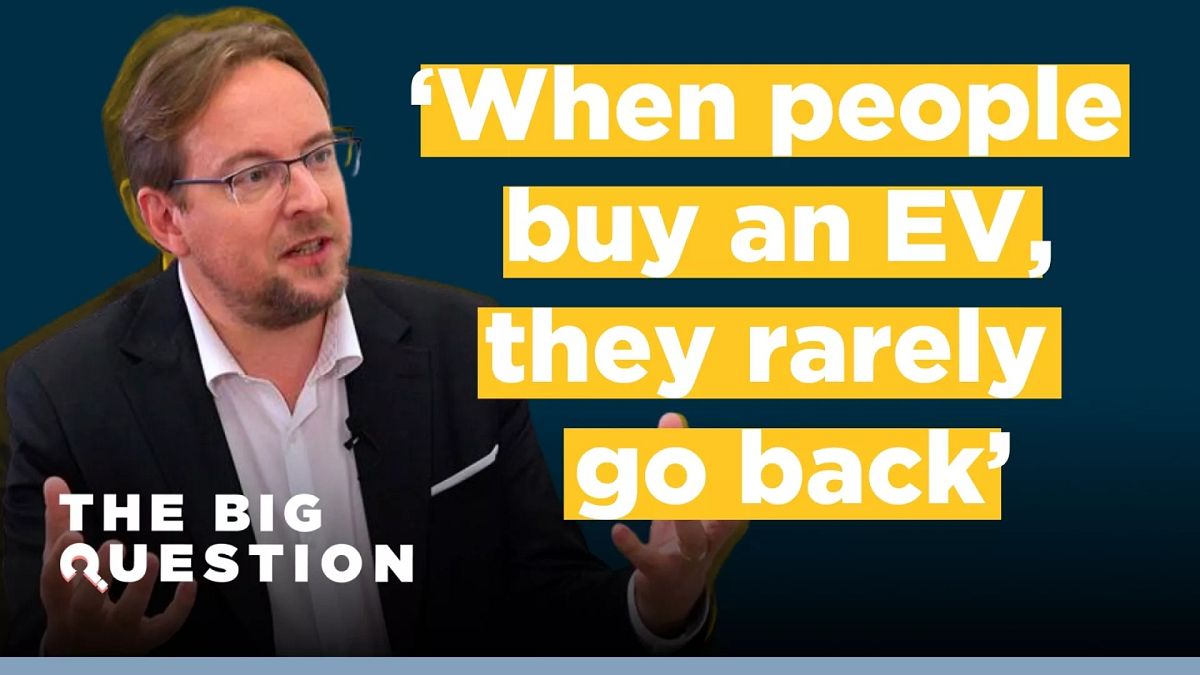Hyundai is probably one of South Korea’s most globally recognisable brands, with only the likes of Samsung and LG also vying for the title.
The Hyundai Motor Group, which owns Kia and Genesis, first arrived in Europe in the late 1970s. However, it was only in 1997 that they opened their first production site outside of South Korea, in Turkey.
“If you look at personal cars we’re at 4% market share in Europe, we’re ranked number 10 on the market,” said Xavier Martinet, President and CEO of Hyundai Motor Europe.
“When you look back in time, 10-15 years ago we were at half this market share, so Hyundai has been growing over time.”
In their 58 years of business, the company has managed to produce more than 100 million units worldwide and its factory in Ulsan, South Korea, is the largest automotive production plant in the world.
In this episode of The Big Question, Hannah Brown sat down with Xavier to discuss Hyundai’s place in the European market and how it sees the future of automotive power.
Hyundai in Europe
Aside from the production plant in Turkey, Hyundai has also been producing vehicles at a plant in Nošovice, Czech Republic, since 2008. Together, the two sites have a production capacity of 560,000 units per year.
According to Xavier, 79% of the vehicles sold by Hyundai in Europe in 2024 were produced in these two plants.
However, the greater-than-predicted success of their smallest EV to date, the INSTER, produced in South Korea, is expected to roll that number back to 70% in 2025.
While Xavier insists there’s no third plant planned in Europe just yet, he suggested that regional success for the firm’s newest releases could ignite a conversation around future investment.
A new EV from Hyundai
Hyundai recently announced the Concept 3 car, an EV in its IONIQ range that’s expected to hit the market early next year.
Positioned in the B-segment, accompanied by the likes of the Ford Fiesta, the Renault Clio and the Peugeot 208, the compact Concept 3 underlines Hyundai’s focus on offering EVs across all market segments—according to Xavier.
“What we see, for example, is that the EV mix is actually higher for fleet customers (who typically buy C- or D-segment vehicles), but retail buyers right now have a lower mix of EV. They still want to buy the old ones because either they don’t find the car they want or the price is too high,” he explained.
“And this is why for us targeting this lower part of the segment with strong EV propositions was fundamental.”
He also highlighted the need to tailor vehicles specifically to the European audience.
“We need to develop products that are really taking into account European customers’ needs, lifestyles, demands—and the Concept 3 is a perfect illustration of that. When we do have global products, we need to calibrate them because you don’t drive on the German Autobahn like you drive on an Interstate in the US, so we need to be able to really adjust and fine-tune the vehicle characteristics so that vehicles satisfy the customers wherever they drive,” Xavier told The Big Question.
What will power cars in the future?
Despite targets to boost EV uptake and Hyundai’s Concept 3 announcement, hybrid cars remain the most popular vehicle type for new purchases in Europe.
“Customers are usually keeping a car an average of six years in Europe. And for them to go directly from an internal combustion engine vehicle to an EV is an act of faith,” Xavier explained.
However, Hyundai isn’t putting all their eggs into one metaphorical EV basket. They’re also leading innovation in the hydrogen-powered vehicle world.
“EVs are one great way to electrify the car park, but we also have some questions about access to rare earth materials and whether these tensions will really change,” Xavier said.
“So it’s quite interesting to develop some kind of alternative that one day might become quite valuable as a compliment. So we’re not opposing the two, we’re just saying it’s good to have different solutions to decarbonise the car industry.”
Right now, the hydrogen-powered vehicle market in Europe is virtually non-existent, with sales only in the hundreds. Cost and infrastructure are two of the main limitations, although Hyundai’s US branch is working on solutions.
“We’re developing a car, bus, truck, and when you look at our plant in Savannah, Georgia in the US, we are also producing our own hydrogen. So, at the end of the day, you are not talking about one car, you talk about an ecosystem,” Xavier explained.
In a symbol of its commitment to diversifying power solutions, Hyundai has pledged to offer European customers an EV, hybrid, plug-in hybrid and hydrogen powered version of each of their models by 2027.
The Big Question is a series from Euronews Business where we sit down with industry leaders and experts to discuss some of the most important topics on today’s agenda.
Watch the video above to see the full discussion with Hyundai’s Xavier Martinet.

